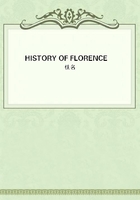
第156章
Antonio, whither he also brought Lorenzo and Guiliano de' Medici, and in a long and serious speech upon the state of the city, the condition of Italy, and the views of her princes, he assured them, that if they wished to live in peace and unity in Florence, free both from internal dissensions and foreign wars, it would be necessary to respect the sons of Piero and support the reputation of their house; for men never regret their continuance in a course sanctioned by custom while new methods are soon adopted and as speedily set aside; and it has always been found easier to maintain a power which by its continuance has outlived envy, than to raise a new one, which innumerable unforeseen causes may overthrow. When Tommaso had concluded, Lorenzo spoke, and, though young, with such modesty and discretion that all present felt a presentiment of his becoming what he afterward proved to be; and before the citizens departed they swore to regard the youths as their sons, and the brothers promised to look upon them as their parents.
After this, Lorenzo and Guiliano were honored as princes, and resolved to be guided by the advice of Tommaso Soderini.
While profound tranquillity prevailed both at home and abroad, no wars disturbing the general repose, there arose an unexpected disturbance, which came like a presage of future evils. Among the ruined families of the party of Luca Pitti, was that of the Nardi; for Salvestro and his brothers, the heads of the house, were banished and afterward declared rebels for having taken part in the war under Bartolommeo Coglione. Bernardo, the brother of Salvestro, was young, prompt, and bold, and on account of his poverty being unable to alleviate the sorrows of exile, while the peace extinguished all hopes of his return to the city, he determined to attempt some means of rekindling the war; for a trifling commencement often produces great results, and men more readily prosecute what is already begun than originate new enterprises. Bernardo had many acquaintances at Prato, and still more in the district of Pistoia, particularly among the Palandra, a family which, though rustic, was very numerous, and, like the rest of the Pistolesi, brought up to slaughter and war. These he knew to be discontented, on account of the Florentine magistrates having endeavored, perhaps too severely, to check their partiality for inveterate feuds and consequence bloodshed. He was also aware that the people of Prato considered themselves injured by the pride and avarice of their governors, and that some were ill disposed toward Florence;therefore all things considered, he hoped to be able to kindle a fire in Tuscany (should Prato rebel) which would be fostered by so many, that those who might wish to extinguish it would fail in the attempt.
He communicated his ideas to Diotisalvi Neroni, and asked him, in case they should succeed in taking possession of Prato, what assistance might be expected from the princes of Italy, by his means? Diotisalvi considered the enterprise as imminently dangerous, and almost impracticable; but since it presented a fresh chance of attaining his object, at the risk of others, he advised him to proceed, and promised certain assistance from Bologna and Ferrara, if he could retain Prato not less than fifteen days. Bernardo, whom this promise inspired with a lively hope of success, proceeded secretly to Prato, and communicated with those most disposed to favor him, among whom were the Palandra; and having arranged the time and plan, informed Diotisalvi of what had been done.
CHAPTER V
Bernardo takes possession of Prato, but is not assisted by the inhabitants--He is taken, and the tumult appeased--Corruption of Florence--The duke of Milan in Florence--The church of Santo Spirito destroyed by fire--The rebellion of Volterra, and the cause of it--Volterra reduced to obedience by force, in accordance with the advice of Lorenzo de' Medici--Volterra pillaged.